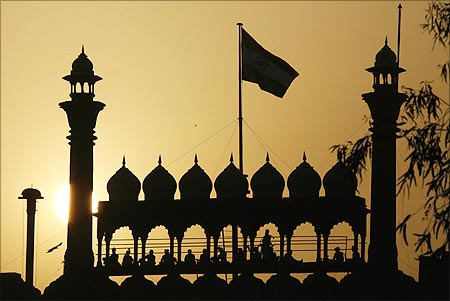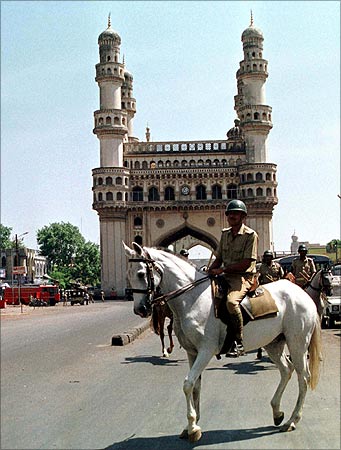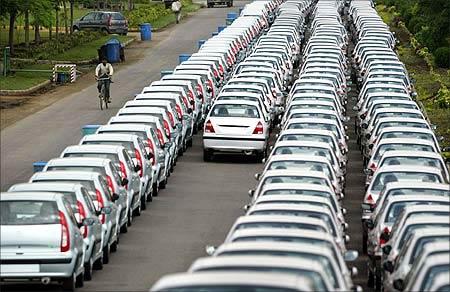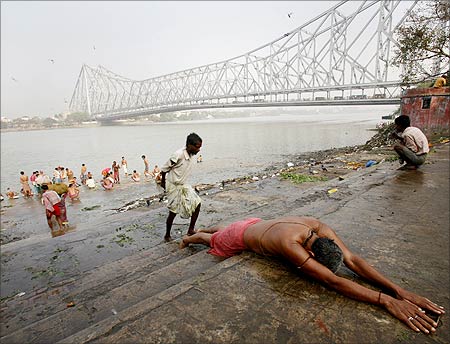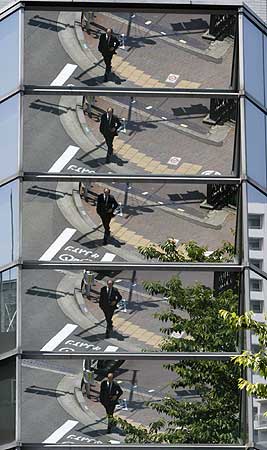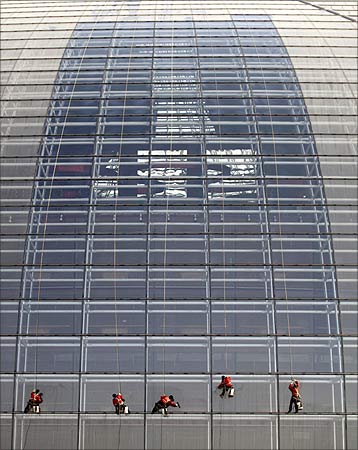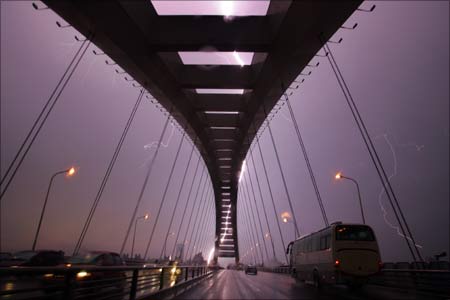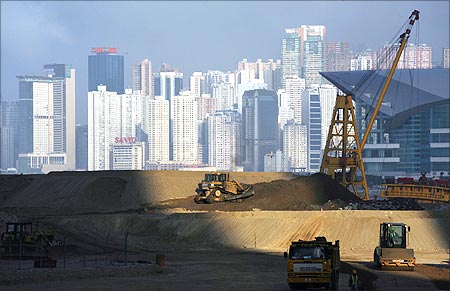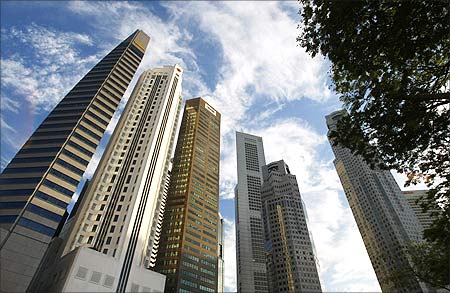 | « Back to article | Print this article |
India's costliest cities to live in
Strong currencies may have pushed up the cost of living for expatriates assigned to major Asian locations, but Indian cities still remain rather inexpensive for an overseas assignee, says a survey.
In fact, seven Indian cities -- New Delhi, Mumbai, Hyderabad, Chennai, Bangalore, Pune and Kolkata -- all witnessed a fall in their global ranks making them cheaper to live in for expatriates, according to the survey by Hong Kong-based solution provider for HR professionals ECA International.
Of the Indian cities surveyed, New Delhi is the most expensive for expats. However, overall, Japanese and Chinese locations dominate Asia's list of most expensive cities.
Let's take a look at some of the costliest cities of India and Asia.
India's costliest cities
NEW DELHI
Rank: 1st in India; 41st in Asia
New Delhi, capital and seat of power of India, is a cosmopolitan city, with government and quasi-government sector being the primary employer.Connaught Place, one of northern India's largest financial centres, is located in the heart of Delhi. Being an important commercial centre in South Asia, Delhi has a per capita income of Rs 53,976, which is more than double the national average.
Delhi's key service industries, backed by as strong and well laid out infrastructure, include IT, telecommunications, hotels, banking, media and tourism. In recent times, Delhi's manufacturing industry has grown considerably and consumer goods industries have established manufacturing units and headquarters in and around the capital.
Construction, power, telecommunications, health and community services, and real estate form the backbone of Delhi's economy. The capital's retail industry is one of the fastest growing industries in India.
Text: Agencies
India's costliest cities to live in
MUMBAI
Rank: 2nd in India; 43rd in Asia
Mumbai, the nation's financial capital, with approximately 19 million population, is the second most populous city in the world.
Mumbai is the commercial and entertainment centre of India, generating 5 per cent of India's GDP, and accounting for 25 per cent of industrial output, 40 per cent of maritime trade, and 70 per cent of capital transactions to India's economy.
Mumbai is one of the world's top 10 trade centres. It accounts for about 1 per cent of the total population in India but has a per capita income which is almost three times that of India. Mumbai also generates 14 per cent of India's income tax collections and 37 per cent of the corporate tax collections in the country.
The city is the berth of significant financial institutions like the Reserve Bank of India, Bombay Stock Exchange and the National Stock Exchange of India.
India's costliest cities to live in
CHENNAI
Rank 3rd in India; 44th in Asia
Chennai is the capital of Tamil Nadu. It has an estimated population of 7.5 million and its economy is supported by industries like automobile, technology, hardware manufacturing, and healthcare.
According to a recent report in The Hindu, economists have predicted that Chennai's per capita income would increase from $468 in 2000 to $1,149 in 2015 and $17,366 in 2050.
The city houses India's major automobile companies and happens to be India's second-largest exporter of information technology and information-technology-enabled services, behind Bangalore.
India's costliest cities to live in
BANGALORE
Rank: 4th in India; Rank 45th in Asia
What was known as the Pensioners' Paradise 10 years back, has grown manifold today and a study reveals that the rupee millionaire club in Karnataka's capital is the most crowded in India.
Bangalore also boasts of having the largest number of households with an annual income of Rs 10 lakhs (Rs 1 million) or more. With an estimated population of 6.5 million, Bangalore is one of India's most populous cities.
Unlike other cities in India, Bangalore's main activity is information technology and information technology-enabled services. Being the leading contributor to India's IT industry, the city is often referred to as the Silicon Valley of India.
India's costliest cities to live in
HYDERABAD
Rank 5th in India; 46th in Asia
Hyderabad, capital of Andhra Pradesh, is known for its rich history, culture and architecture. With an estimated population of 7 million, the city is the biggest contributor to Andhra Pradesh's gross domestic product, state tax and excise revenues.
The city, which used to be primarily a service city, is now the seat of many businesses, including trade, transport, commerce, storage, communication and lately information technology.
Major pharmaceutical companies like Dr Reddy's Laboratories, Matrix Laboratories, Aurobindo Pharma Limited and Vimta Labs are located here.
India's costliest cities to live in
PUNE
Rank: 6th in India; 47th in Asia
Pune is the eighth largest city in India and the second largest in Maharashtra.
The growth of this major industrial city, located roughly 150 km east of Mumbai, has become the topic of discussion these days.
Starting from automobile majors like Tata Motors, DaimlerChrysler, Pune will soon house units of global biggies like General Motors, Volkswagen, Fiat, et cetera. A number of important engineering goods industries like Cummins Engines Co Ltd and Bharat Forge Ltd, electronic goods companies like LG, Whirlpool, food companies like Frito Lay and Coca Cola are also located here.
India's costliest cities to live in
KOLKATA
Rank: 7th in India; 49th in Asia
Kolkata is the capital of West Bengal. Its population, including that of the suburbs, exceeds 15 million.
The city is the main business, commercial and financial hub of eastern India and the northeastern states. It is home to the Calcutta Stock Exchange India's second-largest bourse.
Some reputed companies are headquartered here. Of them, Bata India, ITC Limited, Birla Corporation, Domodar Valley Corporation deserve special mention. Opening of the Nathu La in Sikkim as a trade route has put Kolkata in an advantageous position.Like its many other metropolitan cousins, Kolkata suffered from economic stagnation in post-independence India.
However, since 2000, the city has witnessed an economic rejuvenation, thanks to the development of IT industry in Rajarhat in Greater Kolkata. The city's IT sector is growing at 70 per cent yearly -- twice that of the national average.
Asia's costliest cities to live in
TOKYO
Rank: 1st in Asia
Tokyo, one of the 47 prefectures of Japan, is one of the three world finance 'command centres', along with New York and London.
Tokyo is a major international finance centre, is the headquarters of several of the world's largest investment banks and insurance companies, and serves as a hub for Japan's transportation, publishing, and broadcasting industries.
Tokyo has the largest metropolitan economy in the world. As of 2008, 47 of the companies listed on the Global 500 are based in Tokyo.
Tokyo was rated by the Economist Intelligence Unit as the most expensive city in the world for 14 years in a row ending in 2006.
Asia's costliest cities to live in
BEIJING
Rank: 5th in Asia
Beijing, capital of the People's Republic of China, is China's second largest city after Shanghai. More than 17 million people live in Beijing municipality.
Beijing is recognised as the political, educational, and cultural centre of the People's Republic of China, while Shanghai and Hong Kong predominate in economic fields.
The city's urban area has about 13 million residents. Beijing is a major transportation hub, with dozens of railways, roads and motorways passing through the city. It is also the focal point of many international flights.
Asia's costliest cities to live in
SHANGHAI
Rank: 6th in Asia
Shanghai is often regarded as the centre of finance and trade in mainland China.
It is the largest city in China in terms of population (20 million) and one of the largest metropolitan areas in the world.
Shanghai has one of the world's busiest ports.
In 2008, Shanghai's GDP posted a 9.7 per cent growth to 1.37 trillion yuan. The Shanghai Stock Exchange is the world's fastest growing.
Asia's costliest cities to live in
HONG KONG
Rank: 7th in Asia
Hong Kong is a global metropolitan and international financial centre backed by a highly developed capitalist economy.
Its economy has been ranked the freest in the world by the Index of Economic Freedom for 15 consecutive years.
Hong Kong is an important centre for international finance and trade, with one of the greatest concentration of corporate headquarters in the Asia-Pacific region.
Its high growth rates and rapid industrialisation have earned for it a rank among the Four Asian Tigers.
Asia's costliest cities to live in
SHENZHEN
Rank: 8th in Asia
Shenzhen is a sub-provincial city in southern China's Guangdong province.
Rapid foreign investment since the late 1970s contributed to the city's rapid economic development.
Shenzhen is home to some of People's Republic of China's most successful high-tech companies, such as Huawei, Tencent and ZTE.
A number of foreign IT companies also have facilities in the city.
Asia's costliest cities to live in
GUANGZHOU
Rank: 9th in Asia
Guangzhou, or Canton, is the capital of Guangdong Province and a sub-provincial city in the southern part of the People's Republic of China.
In 2008, Guangzhou's GDP reached Yen 821.58 billion ($118 billion), per capita was Yen81,233 ($11,696)
Guangzhou is the economic centre of the Pearl River Delta, one of mainland China's leading commercial regions.
Asia's costliest cities to live in
SINGAPORE
Rank: 10th in Asia
Singapore, an island city-state, has an export driven economy.
Singapore's well-diversified manufacturing industry consists of electronics, petroleum refining, chemicals, mechanical engineering and biomedical sciences.
Singapore has one of the busiest ports in the world and is the world's fourth largest foreign exchange trading centre after London, New York City and Tokyo.
